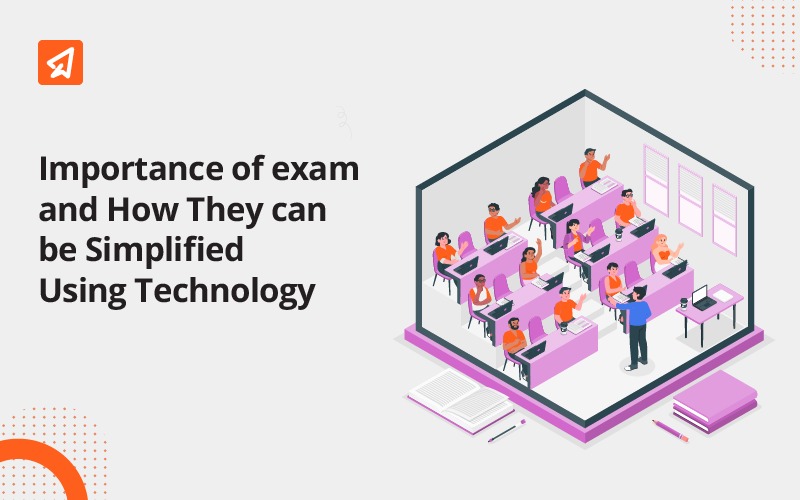Importance of exam and How They can be Simplified Using Technology

Exams – the word itself might trigger strong emotions in many of us. Some might recall the butterflies fluttering in their stomachs before a big test, while others might vividly remember the joy of acing a challenging exam. As a teacher, holding examinations is probably a big part of your job, and you’ve probably seen a number of students struggle immensely with taking their tests. Let’s take a moment to ponder why exams hold such significance in education. In this blog, we’re going to dig deeper into the purpose of holding exams and explore what exactly exams measure and how you can use technology to make the process of examinations easier on your students..
What is the Purpose of Exams?
Exams play a multifaceted role in education, extending beyond the evaluation of performance. They provide valuable insights into students’ learning journeys and offer a holistic assessment of their capabilities. Let’s explore the reasons why exams are important:
1. Assessing Knowledge Retention
Exams serve as significant milestones in a student’s academic journey, presenting unique opportunities to assess their understanding and knowledge retention. By evaluating subject-specific content, exams allow educators to gauge how effectively students have absorbed essential concepts and information. Through carefully crafted questions, exams test not only the memorization of facts but also the application of knowledge in different contexts.
2. Encouraging a Sense of Achievement
Setting clear learning objectives and assessment criteria in exams offers students specific goals to work towards. Successfully accomplishing these objectives instills a sense of achievement, boosting students’ self-confidence and motivating them to pursue excellence in their academic pursuits. The joy of achieving a desired outcome or obtaining commendable grades reinforces a positive attitude toward learning.
3. Identifying Learning Gaps
Exams play a crucial role in identifying areas where students might be encountering learning gaps or experiencing challenges. By thoroughly analyzing exam results, educators gain valuable insights into individual learning needs, allowing them to tailor their teaching methods to address these specific requirements.
4. Providing Feedback
A significant advantage of exams is the opportunity they afford educators to provide valuable feedback to students. Constructive feedback, offered after a thorough examination of students‘ performance, highlights their strengths and areas for improvement. This feedback-oriented approach empowers students to reflect on their academic progress, encouraging them to take proactive steps toward enhancing their performance and overall skill set.
5. Encouraging Discipline and Consistency
The preparation required for exams instills a sense of discipline and consistency in students’ study routines. As exams necessitate regular revision, practice, and preparation, students develop a habit of diligence and perseverance. This cultivated discipline extends beyond the examination phase, becoming an integral part of their academic journey and fostering a culture of lifelong learning.
6. Preparing for Real-Life Challenges
Exams, especially those that incorporate practical scenarios and real-world applications, simulate the challenges students may encounter in their future careers. By navigating such assessments, students develop critical skills necessary for real-life problem-solving and decision-making.
What Exams Measure

Exams provide a comprehensive evaluation of students’ capabilities, extending beyond simple knowledge assessment. These include aspects like critical thinking, reading comprehension, time management, and much more. Let’s delve into the diverse aspects that exams measure:
1. Knowledge and Understanding
Exams serve as windows to assess the depth of students’ knowledge and their comprehension of essential concepts across various subjects. Rigorously designed questions gauge their ability to recall information, comprehend theories, and demonstrate proficiency in applying knowledge across diverse contexts.
2. Critical Thinking and Problem-Solving
Beyond assessing factual knowledge, exams provide a platform to evaluate students’ critical thinking and problem-solving prowess. Scenario-based questions and open-ended problems encourage them to analyze situations, exhibit analytical skills, and display creativity in formulating effective solutions.
3. Communication Skills
The art of effective communication is a crucial skill in the modern interconnected world. Exams often encompass segments that evaluate students’ written and verbal communication abilities. Through well-articulated responses, essays, or oral presentations, students demonstrate their capacity to convey thoughts with clarity and coherence.
4. Time Management and Organization
The examination environment challenges students to optimize their time management and organizational skills effectively. The pursuit of completing exams within a stipulated time frame requires strategic planning and the proper allocation of time.
5. Subject Proficiency
Customized subject-specific exams delve into students’ proficiency in specialized disciplines. Such assessments provide educators with valuable insights into each student’s strengths and weaknesses, facilitating informed decisions concerning academic pursuits and career aspirations.
Concerns With Exam-Driven Education
While exams play a significant role in education, an overemphasis on exam results can lead to concerns. It is crucial to recognize and address these issues to create a more balanced and effective assessment system:
1. Rote Memorization vs. Understanding
Within an exam-centric education system, the temptation to resort to rote memorization can be alluring for students. Instead of truly grasping the underlying meaning of concepts, they may adopt a surface-level approach, merely memorizing information to secure desirable grades. This practice can hinder their ability to apply knowledge critically and creatively and limit their potential to think outside the box.
2. Exam Stress and Anxiety
High-stakes exams can cast a shadow of immense pressure on students, eliciting feelings of stress and anxiety. The fear of failure and the desire to meet societal expectations can weigh heavily on their young minds, impacting their emotional well-being and mental health. Left unaddressed, this burden of exam-related stress can have long-lasting consequences on students’ confidence and overall academic performance.
3. Narrow Definition of Success
An excessive focus on exam scores may inadvertently cultivate a narrow and rigid definition of success. While academic achievements are undoubtedly essential, solely gauging success through exam results might overshadow other equally valuable aspects of education. Vital attributes like personal growth, creativity, adaptability, and empathy may not receive the recognition they deserve, neglecting the holistic development of students as well-rounded individuals.
4. Inadequate Skill Assessment
Traditional exams, structured to assess theoretical knowledge, may not fully capture the diverse skill sets that students possess. Valuable abilities such as practical aptitude, critical thinking, effective communication, teamwork, and adaptability often find limited representation in conventional examination formats. A more comprehensive assessment system should be thoughtfully designed to encompass a wider range of skills, providing a holistic view of students’ capabilities.
How Extramarks Can Simplify the Evaluation Process
Extramarks, powered by our innovative Smart Class Plus Platform, takes the evaluation process to a whole new level, benefiting both students and teachers alike. Let’s dive into how our revolutionary platform makes preparing for exams a breeze:
1. Setting Papers is Simple
The Extramarks Teaching App offers an array of assessment options with an extensive question bank and customizable templates. Teachers can easily create well-rounded exams that cater to diverse learning needs and styles.
2. Works Against Cheaters
Our platform offers a power questions feature that presents the same question with different variables, encouraging students to think creatively and independently. This fosters a deeper engagement with the subject matter and ensures a genuine grasp of the concepts being tested while minimizing the possibility of cheating.
3. Personalized Learning Paths
Extramarks provides teachers with valuable insights into each student’s academic progress. Our assessments help pinpoint individual learning gaps, allowing teachers to tailor their instruction and pace according to each student’s needs.
4. Data-Driven Feedback
Our analytics dashboard enables teachers to provide timely and constructive feedback to students. Immediate insights empower students to learn from their mistakes promptly and make necessary improvements, fostering continuous growth and self-improvement.
5. Interactive Interface
Using interactive learning makes exams less stressful or anxiety-inducing for students. Gamified question formats make taking exams a more fun and approachable challenge. Multimedia questions ensure that exams are always interesting.
6. Automated Evaluation
With automated evaluation, teachers save valuable time and effort. This efficiency allows teachers to invest more energy into strategizing their teaching methods, teaching their classes, and supporting individual students’ academic journeys.
In conclusion, exams are crucial elements of education, providing invaluable insights into students’ academic prowess. They measure both knowledge and critical skills necessary for success in the real world. However, an excessive focus on exams can lead to concerns like rote learning, student stress, and a limited view of success. The Extramarks Smart Class Plus Platform offers a modern solution, ensuring comprehensive assessments, personalized learning paths, formative feedback, and stress-free evaluations. With Extramarks’ innovative approach to exam preparation, educators can support students’ growth, instilling in them a love for learning and empowering them to succeed beyond exam scores. By striking a balance between exams and holistic education, we can nurture well-rounded individuals equipped to thrive in the ever-changing world.
Last Updated on April 16, 2025
Reviewed by

Prachi Singh | VP - Academics
Prachi Singh is a highly accomplished educationist with over 16 years of experience in the EdTech industry. Currently, she plays a pivotal role at Extramarks, leading content strategy and curriculum development initiatives that shape the future of education...read more.










